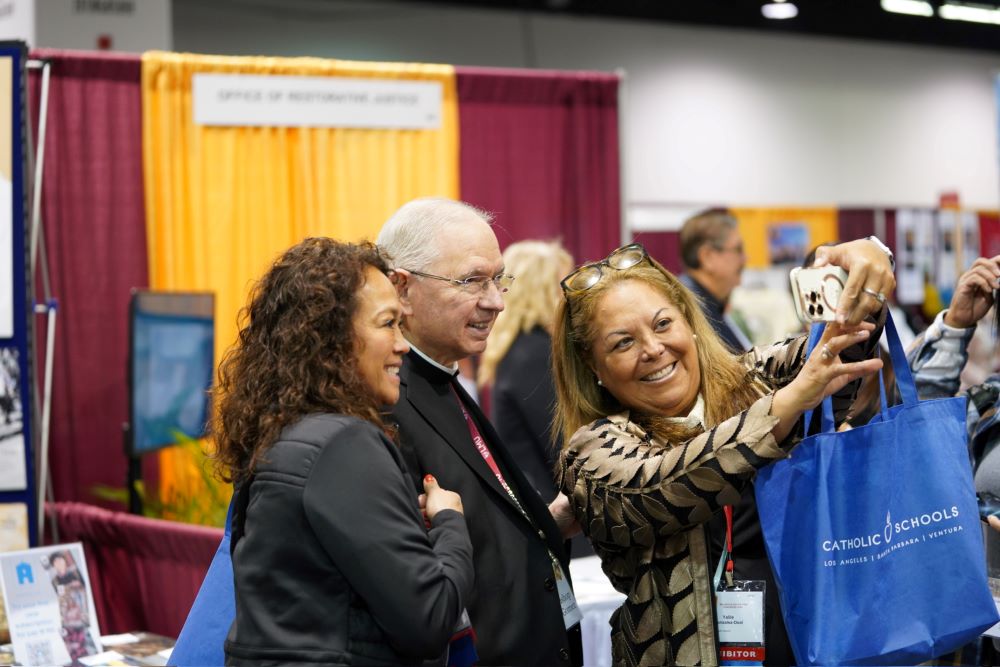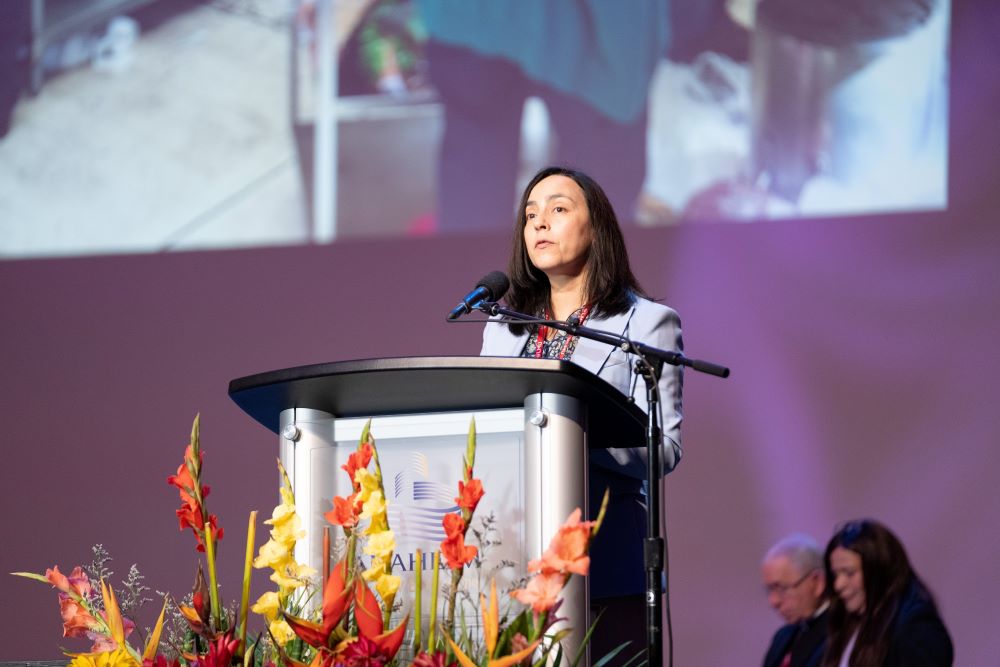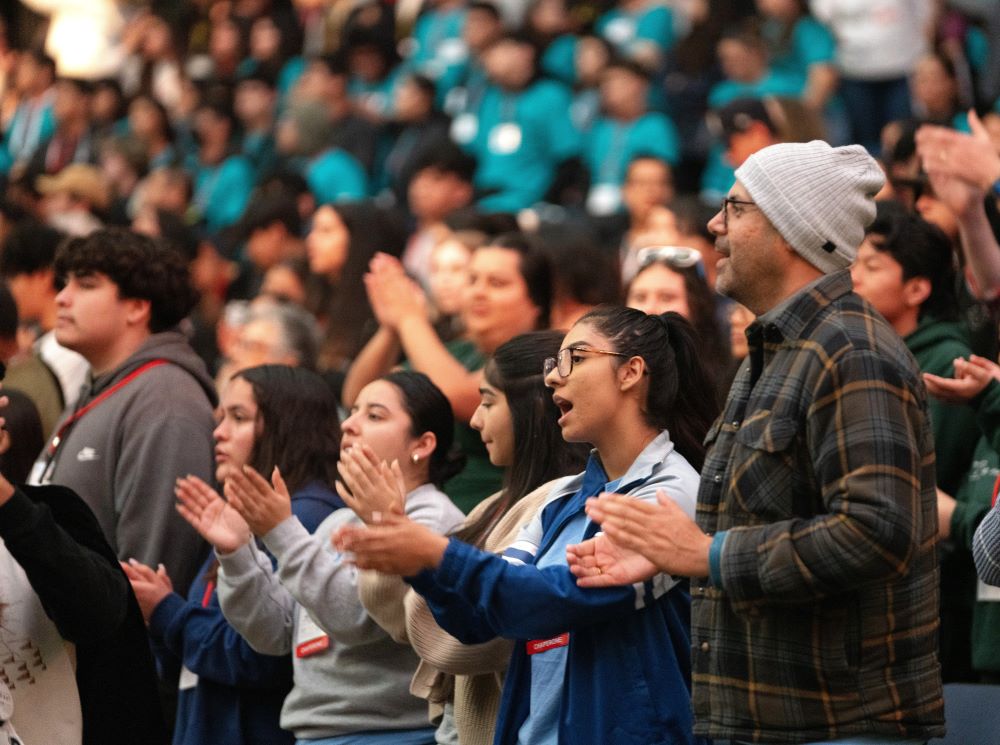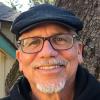
Attendees take a selfie with Los Angeles Archbishop José Gomez Feb. 16 during the 68th Los Angeles Religious Education Congress at the Anaheim Convention Center. (OSV News/Courtesy of LA Archdiocese)
For four days in February, the Anaheim Convention Center and Arena in California was transformed into a worship center, sacred space, parish, seminary and retreat grounds through the annual Los Angeles Religious Education Congress. From its beginnings in 1956 as a learning event for catechists, it retains that purpose and has since expanded to form, transform and connect broader audiences.
I have attended six congresses, both in person and online during the pandemic. (I learned of the congress when I was briefly an eighth-grade catechist in Pomona, California; while I may have some gifts, that was not one of them!) From the time you walk through the doors to register, to the final Mass and eucharistic celebration, you are surrounded by Catholic individuals, resources, sounds and images.
The theme of the Feb. 15-18 event at the Anaheim Convention Center was "Be Loved/Dejate Amar!" and the opening ceremony and welcome enveloped you in the theme of God's love. The beautiful melody of "Be Loved," composed by Chris De Silva, and speakers like Verbum Dei Sr. Rosalia Meza, director of the LA archdiocese's Office of Religious Education, reminded the gathered that awareness of God's love is the basis of our transformation and vocation. The song proclaimed, "when we know God's love, we will show God's love."
Aware that the Catholic Church is already a "big tent," and that Pope Francis' synodal process urges that we enlarge it, the congress is a window into the riches of the Catholic Church and the people of God. In addition to morning praise Friday and Saturday, it offered eight workshop sessions of 10 options each, a vast exhibit hall, sacred space, times for confession, multicultural or multi-themed liturgies Friday and Saturday, two Masses on Sunday, speaker and author book signings, and many other events.

Young people take part in Youth Day Feb. 15 during the 68th Los Angeles Religious Education Congress at the Anaheim Convention Center. (OSV News/Courtesy of Dan Gonzalez)
The exhibit hall features Catholic outreach organizations, religious orders, schools of theology and ministry, music resources, book publishers, and dozens of other resources intended to enhance our spiritual life and work in religious education, the common good and social justice. Yet, as great as the offerings are, the greatest gift of the congress comes in the impromptu conversations with Catholics representing diverse cultures, backgrounds, nations, vocations, and journeys. A typical walk can lead to conversations with Norbertine priests, Catholic Women Preach homilists, theology students, Jesuit novices, lay people working as catechists, prison ministers, immigration advocates, human trafficking opponents, and an almost endless array of vocations and callings.
I attended seven workshops this year, and in each the speaker shared revelatory insights which I will draw from for some time. The workshops remind me of the words of Psalm 36:9, "They feast on the rich food of your house; from your delightful stream you give them drink."
In the first workshop, Dominican Sr. Carol Dempsey asked that we study the biblical text from our own experience of the Holy One as a God of love. Thus, she said people must read passages that justify war, violence and male dominance from the perspective of those who are hurting. She urged us to "decolonize" our minds and "deconstruct" familiar interpretations with hearts open to what a God of love would say to a world in need of healing and transformation.
Next I heard Jesuit Fr. James Martin share wisdom from his book, Come Forth: The Promise of Jesus's Greatest Miracle, about the raising of Lazarus. Martin showed that the raising of Lazarus has implications for our own lives, that as Jesus asked Lazarus to "come forth," we too are to enter the sunlight of God's love and leave behind what holds us down. Also, Jesus' call to "unbind him and let him go" (John 11:44) is a call for us to free those around us from all that hinders their full humanity.

Young people take part in Youth Day Feb. 15 during the 68th Los Angeles Religious Education Congress at the Anaheim Convention Center. (OSV News/Courtesy of Dan Gonzalez)
I then attended Fr. Richard Fragomeni's beautiful reflection on the Eucharist. Quoting St. Thomas Aquinas, he reminded us that the Eucharist is "infinitely comprehensible, not incomprehensible," as its riches can never be exhausted. He emphasized that the core of the eucharistic celebration is the divinization of our human nature and transformation of the community into the body of Christ on earth. Fragomeni noted the Western church, unlike the East, has muted this reality. Our closest acknowledgment is when the priest whispers, "By the mystery of this water and wine, may we come to share in the Divinity of Christ, who humbled himself to share in our humanity." He urged us to recover this beautiful image and call.
Friday night's Mass was celebrated by San Diego Cardinal Robert McElroy and featured the music of Sarah Hart. The music, the homily and the Eucharist highlighted our call to be aware of, and give back to the world, the grace and love of God.
That evening's Taize service with singing, readings, prayers and a communal prayer around the cross was an unforgettable and transformative experience.
Saturday's morning praise talk was by Jessica Sorowitz, who spoke of the devoted ministry of the late Franciscan Sr. Marie Rosa Leggol, called by some the "Mother Teresa of Honduras." Leggol is said to have helped 87,000 children and families escape violence and poverty. When men in government or church hierarchy tried to restrict her ministry, Leggol said, "my orders come from above, and the man who can give me orders has not been born."
Saturday's first workshop was with M. Roger Holland and Kate Williams, who shared their authentic and vulnerable exchange of letters which leapt across the racial divide for awareness and healing. They also engaged the audience with reflection questions to open a wider dialogue.
My next session was African American Jesuit Fr. Joseph Brown on "The Welcome Table." This session highlighted the wisdom of the slave spirituals, which he noted reappropriated Scripture from a justification of slavery to the liberation of the enslaved. For them, epistles which urged "slaves obey your masters" were ignored in favor of Moses the liberator and Jesus the crucified and raised. While white Christians promoted a God of Black degradation, the enslaved sang of "plenty good room in my Father's house, choose your seat and sit down." He also pointed out as the enslaved watched white Christians whip, rape and torture their "property," they sang, "everybody talking about heaven ain't going there."
The Saturday night young adult liturgy featured energetic music, sacred dance and a homily from Fr. David Romero. Emphasizing the congress theme, Romero reminded us of the words of St. John of the Cross, "When God looks, God always loves."
Sunday opened with Eucharist celebrated by Bishop Kevin Vann of the Diocese of Orange, California, who broke open the Gospel reading on the Transfiguration.
I also attended theologian Julie Rubio's presentation on "Can you be a Catholic and Feminist?" Drawing from theologians St. Joseph Sr. Elizabeth Johnson, M. Shawn Copeland, Sandra Schneiders, Franciscan Sr. Thea Bowman and her own experiences and insights, Rubio showed how one could live in the tension of feminism and Catholicism. She highlighted a "conscious belonging," where one could remain Catholic despite the contradictions, and work to create space where women's voices and presence is continually enlarged and expanded.
Advertisement
Highlighting the congress, however, is the gift of numerous encounters with devoted and sincere Catholics from so many different backgrounds. I met Hispanic, Filipino, Vietnamese, African American and Caucasian Catholics, as well as others from Nigeria, Australia, Canada and other nations. In hallways, over meals, in the exhibit hall, before and after Mass, I had more enriching encounters and conversations than I could count.
We were also reminded of the life of the late auxiliary bishop of Los Angeles, David O'Connell, murdered by a gunman one year ago. Everyone I met from Los Angeles spoke fondly of his authentic love for those on the margins, his pastoral care and his open heart. O'Connell clearly lives on in the vocations of those he encountered.
The congress is a vivid reminder that we are not Catholic alone, that we are surrounded by, and in fact are one with, a "great multitude that no one could count, from every nation, from all tribes and peoples and languages …" (Revelation 7:9). From the opening song to the closing Mass, the message was clear, "If you see God's love, you could be God's love."








